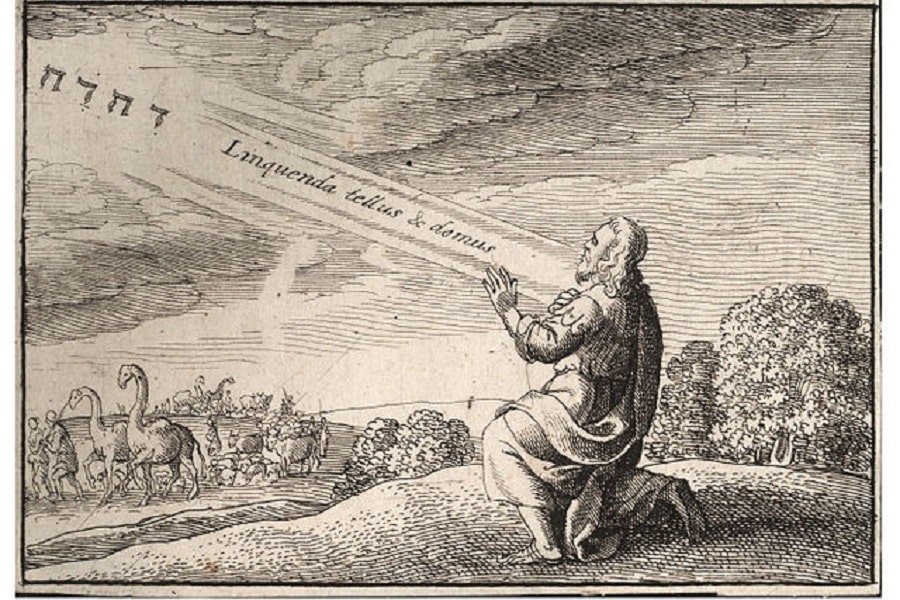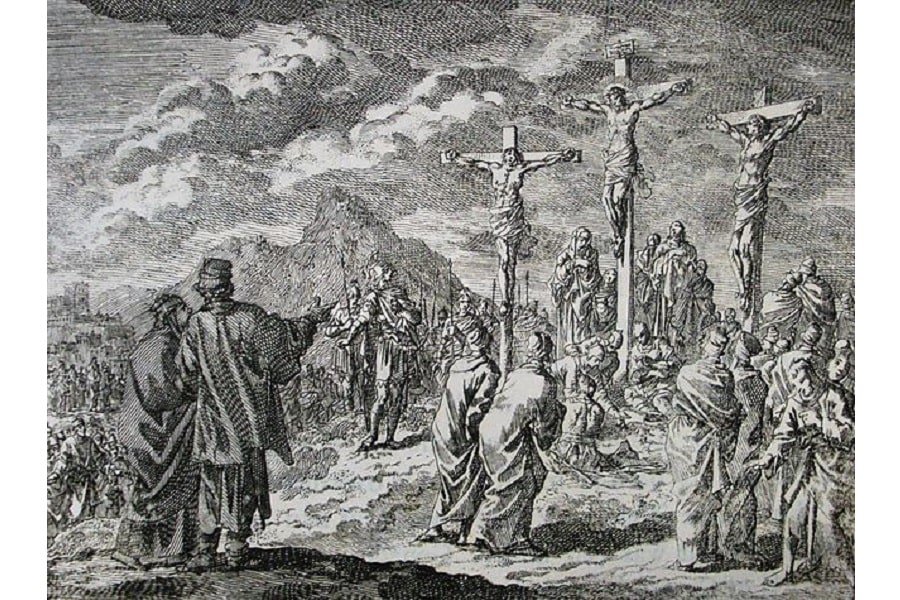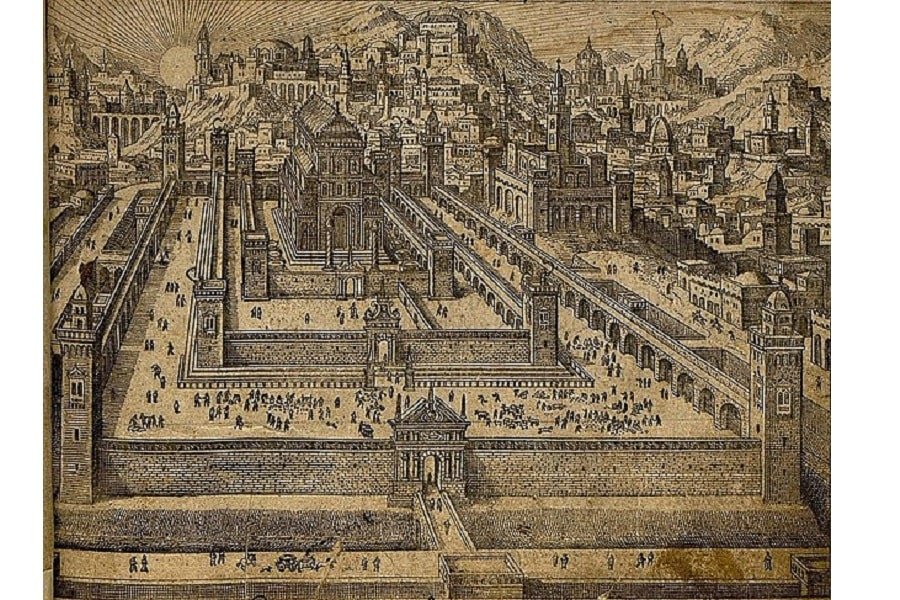The origins of Judaism can be traced back to ancient times and the region of the Middle East known as Canaan (present-day Israel and Palestine). Judaism is considered one of the oldest monotheistic religions, with its roots dating back over 3,000 years.
According to Jewish tradition and biblical accounts, Judaism was founded by the patriarch Abraham around 1800 BCE. However, it is important to note that the historical origins of Judaism are complex and are still subject to research and interpretation.
Table of Contents
What are the Origins of Judaism?

Current studies show that the origins of Judaism lie even further back than the actual religion itself, to Bronze Age civilizations and various ancient, polytheistic Semitic religions. Thus, there is Judaism that began with Abraham and his children. And there is also a precursor to the modern religion that coexisted with various Babylonian religions.
When Was Judaism Founded?
Officially, according to the Torah, Judaism began with Abraham, the first Jew. It is almost impossible to put a date to this man’s life. Nowhere in the holy books is any specific date mentioned and historically such a man may never have lived. It may have been around 1800 BCE, which would make Judaism over 4000 years old. The religion is, in reality, older. It separated from Yahwinism, its precursor, in the 5th or 6th century BCE. However, Jewish people did not really call themselves Jews until about 500 BCE.
What Was the Precursor to Judaism?
At some point in antiquity, Judaism as we know it today broke away from an older faith called Yahwism. The roots of both lie in the Bronze Age religions of the Middle East (also known as the Cradle of Civilization), specifically Ancient Canaanite polytheism. Yahwism believed in a plethora of gods and goddesses, like most ancient religions. However, the central god was Yahweh, the national god of the Israelite kingdoms of Israel (known then as Samaria) and Judah. These two Iron Age kingdoms first rose up around the 9th century BCE.
READ MORE: Ancient Civilizations Timeline: The Complete List from Aboriginals to Incans
Yahwism gradually began to suppress the worship of the other Canaanite gods. They still believed in the existence of the other gods but they were not considered as important. Yahwism practiced various private and public rituals, including sacrifices and vow-making. All the neighboring Canaanite kingdoms had their own national god and his consort, which was Yahweh and Asherah in the case of Israel and Judah. They ruled over a pantheon of other lesser gods. By the 5th or 6th centuries BCE, however, Yahweh had absorbed all the positive qualities of the other gods and a movement had started to worship Yahweh alone. This was essentially the birth of Judaism as a monotheistic religion.
READ MORE: Pagan Gods from Across the Ancient World
Scholars believe that the reason for this shift may have been the Assyrian conquest. Both Israel and Judah were vassal states of Assyria. When Israel rose up in rebellion and was vanquished, many refugees fled to Judah. There, they brought the belief that Yahweh was not only the most important god but the sole god that should be worshiped. The elite in Judah took up this belief and raised the child-king Josiah, who reigned from 641 to 609 BCE, in opposition to the Assyrian Empire and with loyalty to Yahweh. Under his reign, the belief in the sole god Yahweh became more popular. This view was cemented in the 5th century.
However, other kinds of Judaism also emerged around this time. This includes Hellenistic Judaism and Second Temple Judaism, which has certain similarities with Zoroastrianism. Another religion that broke away from Yahwism is Samaritanism.
Who Was the ‘Founder’ of Judaism?

The Torah says that the first Jew, who is the common ancestor of the Jewish people, is Abraham. He is also the common Hebrew patriarch for the religions of Islam and Christianity. Thus, the reason all three are called Abrahamical faiths. As such, we can say that Abraham was the founder of Judaism as well as the physical and spiritual ancestor of the Jewish people. Jews themselves do not really call Abraham the founder of their religion in the way Christianity regards Christ or Islam regards Prophet Muhammad.
READ MORE: How Did Christianity Spread: Origins, Expansion, and Impact
It is said that the one God revealed himself to Abraham and made a special covenant with him. He and his descendants were the chosen people who would create a great kingdom. They were called upon by God to leave their home and settle in the land of Canaan, the promised land.
Abraham and his wife Sarah had a son called Isaac when Abraham was a hundred years old and Sarah ninety, even though Sarah had been barren all those years. God proclaimed that Abraham’s descendants through Isaac would rule over many lands. This is why his name was changed from the original ‘Abram’ to ‘Abraham,’ meaning ‘father of many nations.’
Isaac married a woman named Rebekah and had twins, Jacob and Esau. Abraham lived to witness their birth. Abraham’s son Isaac and grandson Jacob are also immensely important to ancient Jewish history. Jacob ultimately took on the name Israel and his descendants came to be known as Israelites. He had twelve children with various women, who all went on to head an important family. These were the Twelve Tribes of Israel.
The Ancient Israelites
We cannot speak of Jewish history without referencing the ancient Israelites. Who were the ancient Israelites? They were the people who lived around the area that is modern Israel – also known as the promised land – before 1000 BCE. This area also used to be called the ancient Levant or ancient Canaan. The Israelites believed they were the descendants of Abraham, Isaac, and Jacob. But it is more likely that they were simply a cultural and linguistic homogenous group of people.
The story of the Exodus and liberation from Egyptian enslavement is something that binds the Jewish people even closer together. The story goes that ancient Israel was suffering from great droughts. Thus, the ancient Israelites went down to ancient Egypt in search of sustenance. They were a minority in the Egyptian population and were enslaved by the Egyptian pharaohs. However, God intervened through the prophet Moses. He sent down the plagues to trouble the Egyptians and Moses led the Israelites away from Egypt.
The Israelites, being freed from slavery, journeyed through the wildernesses of Egypt and Canaan. Moses led them across the Red Sea and when they reached Mount Sinai, they received divine instruction from God there – the ten commandments. Ultimately, they reached the promised land once again. This was the area where Abraham, Isaac, and Jacob had resided generations ago.
Whether the Exodus from Egypt actually happened or not, it left the Israelites from 1000 BCE with a powerful feeling of bonding and community. They were personally invested in that history. The story of the liberation from Egypt gave them a powerful feeling of patriotism and it bound them together as one people.

The Golden Period
The ‘Golden Period’ of ancient Israel is the years between 1010 and 931 BCE. This was the era in which King David and King Solomon ruled. The former is believed to have built the city of Jerusalem at the center of ancient Israel. King Solomon is believed to have constructed the first great temple in 957 BCE. It is safe to say that the so-called golden age only lasted for a very short time before the Assyrian Empire conquered them.
Of the twelve tribes, the northern ten tribes made up Israel and the two southern tribes made up the tiny kingdom of Judea. Although the latter survived the conquest of the Assyrian Empire, they received a severe blow when the Empire of Babylon conquered it. This could have been the end of the Jewish religion since the Babylonians were in the habit of destroying the cultures of the places they invaded and conquered. However, many Jews fled to different parts of the Middle East and Egypt. This led to the beginning of the Jewish diaspora.
While the Israelite religion is not exactly the Jewish religion that is practiced in the modern day, it still has many similarities with it. The history of the ancient Jewish people is the story of a small group of people, surrounded by larger and more powerful parties, trying to hold on to their identity despite that. They were a monotheistic people with a very fervent belief in their one God which helped them preserve their identity, culture, and religion in the face of all the polytheistic religions they were surrounded by.
The Persian Empire and Judea
The Babylonian Empire didn’t last long beyond their conquest of Judea. The Babylonians were soon defeated and conquered by the Persians, who had very different policies about the people they conquered. They did not believe in exiling elites and wiping out local cultures. Rather, they wanted to ensure peace by restoring people to their homelands and letting them live by their ancestral laws. They even helped them rebuild their temples.
For this reason, the Persian Emperor Cyrus is extremely important to the Jewish people. He allowed the many Jews who had fled to return to Judea. The Israelites were henceforth known as Judeans (and later Jews) by everyone else. They still refer to themselves as the descendants of Israel however. This period of Persian rule is when the Torah, which had been passed down orally till then, was written down.
After this came the Greeks and the invasion of Alexander. That had a huge impact on the Jews, just as it did on the rest of the ancient world. Many Jews ended up joining his armies and traveling with him to various parts of the world. Everywhere that Alexander established a city (always called Alexandria) he gave people land grants to settle there. Thus, Jews settled all over the Hellenistic Empire.

READ MORE: The Lighthouse of Alexandria: One of the Seven Wonders
Persecution of Jews
Jewish history has been riddled with persecution at the hands of more powerful forces. The ancient Greeks and Romans looked upon the Jews and their worship of a single god with suspicion. But while the Greeks contented themselves with some anti-Jewish writings, this changed with the Roman Conquest. As the Romans began to take away the privileges of the Greek elite, the Greeks began to focus their anger on the Jews instead of on Roman imperialism.
This was especially true in Egypt, where tensions were brewing between all the different factions that lived there. The Roman conquerors saw the inhabitants of the conquered territories as either Romans or non-Romans. The Greek immigrants in various territories, who had become used to being treated as superior, were enraged at having their ‘rights’ taken away. In Alexandria alone, the Romans compromised that the Greeks and Jews could retain their privileges. In the rural areas, they were classified as foreigners and had all their privileges wiped away.
The Greeks did not think it fair that the Jews should be included in this compromise. They saw them as being lawless and uncivilized. They even accused them of hating God and having secret rituals where they cannibalized other humans. They accused the Romans of taking away privileges from the Greeks and giving them to Jews instead. The local people of Egypt, resentful of all outsiders, also bought into this false narrative and became increasingly anti-Jewish as well.
This ended in the destruction of the Jewish community in Egypt. Attacks, riots, and mobs became more and more common in the Jewish quarter through the first century CE. The Romans took away their land and the entire Jewish population in Egypt was gradually eliminated.
The Breaking Off of Christianity
And then came Christianity. Even though Jesus himself and his teachings and followers were Jewish, his death came at the hands of the Jewish priests in Jerusalem. Believing Jews then refused to see Jesus as a Messiah. How could the Messiah have died? Thus, the movement around Jesus, after his death, was mostly formed of non-Jews or ex-pagans.
Christianity separated from Judaism by claiming Christianity as a replacement for Judaism. The leaders claimed that the Jews were reading their scriptures wrong and the Christians were the true Israelites. They claimed the Jews were blind and ignorant. When the Roman Empire conquered Judea and destroyed the Temple, the Christians took this as further confirmation of their beliefs.
The Christian and Jewish populations of those lands continued to fight for years afterward. As Christianity continued to expand and became the biggest religion in the world, anti-Jewish feelings became more and more common. Medieval Europe, dominated by the Catholic Church as it was, was especially notorious for anti-Jewish violence. They have been seen as the ‘others’ and as outsiders throughout history. This made them a convenient target for political leaders. It wasn’t even about their religion so much as it was the fact that their way of life did not fit in with the rest of society.

Jewish Holy Books
Judaism has several holy books, although the Torah is the most important of them all. The Torah is a part of the Tanakh (the Hebrew Bible) and that is the sacred text of the Jewish people. The Tanakh is the collection of Hebrew scriptures and the Nevi’im and the Ketuvim as well as the Torah. The stories in the Tanakh are not dissimilar to the Christian Old Testament. The Tanakh contains the history of the Jewish people, poetry, hymns, prophetic and wisdom literature, and mythological allusions.
There are, however, other texts that were written later. In 200 CE, scholars compiled the Mishnah. It was a text that described and explained the Jewish code of law. These had previously been orally passed down through generations. The Talmud was a text that was created even later, containing the Mishnah and another text called Gemara, which examines the Mishnah. It is a collection of the interpretations of hundreds of rabbis. The first version was completed in the 3rd century CE and the second version in the 5th century CE.
The earliest Jewish prayer book can be traced back to the 9th century CE. The Haggadah (the service book for Passover Eve) was originally a part of the prayer book. However, in the 13th century CE, it became a book in its own right. The Haggadah is very often illustrated.
The Torah

The most important Jewish sacred text, the Torah contains the first five books of the Hebrew Bible. While it contains some of the same stories as the Old Testament, the stories are not in the same order. It has the books of Genesis, Exodus, Leviticus, Numbers, and Deuteronomy.
Torah is often used to refer to the totality of teachings relating to Jewish religious beliefs and Jewish life. But essentially, it consists of the origins of the Jewish people: their existence due to the call of God, the difficulties they faced, and their covenant with God. The book is extremely important in Rabbinic traditions as it is believed to contain all the teachings that God gave Moses for the Jewish people.
Traditionally, the words of the Torah are written in Hebrew on a scroll by a scribe. Portions of the Torah are read publicly once in three days in front of a large group of people. Jewish communal life is incomplete without these public readings.
Jewish Temples
King David ruled over Israel and Judea around 1000 BCE. His son, Solomon, was the one who built the first holy Temple in Jerusalem. This was the center of worship for the Jews until the kingdom fell apart because of Assyrian invasions. It was in 587 BCE that the Babylonians destroyed the first temple and sent many of the Jewish people into exile.
A second temple was built after the fall of Babylonia and the return of the Jews under the Persian Empire. However, this too was destroyed by the Romans in 70 CE. After this, the Jews had no central place to all worship together and began to patronize local synagogues instead.

Rabbinic Judaism
For centuries, the common narrative was that Judaism had come before Christianity and the latter had broken away after the destruction of the Second Temple in 70 CE. However, scholars and historians, from the latter half of the 20th century, began to argue that the actual history of the two religions was slightly more complicated than that.
There were many Jewish sects in the 1st century CE, all existing in competition with each other. The most notable of these sects were the Pharisees and the Sadducees, although there were also many smaller sects. Modern scholars argue that the sect that developed into Rabbinical Judaism and the sect that eventually became Early Christianity were just two of these many sects. Thus, it was not an evolution and a separation. Rather, the two religions developed in parallel to each other. Modern Judaism and Christianity as we know it did not yet exist during the 1st century.
The nascent Rabbinic Judaism and Christianity during these times had a great deal of interaction with each other. They were intimately entwined and connected, which is why there are so many similarities in their holy texts, their ways of worship, and their belief systems. It was only after the final codifying and writing down of the laws in the 6th century that the final break between the two religions occurred. Thus ended the foundational era of Rabbinic Judaism and the modern Jewish traditions were firmly established.
“Divine Defecation??” aka ‘Holy shit!!’